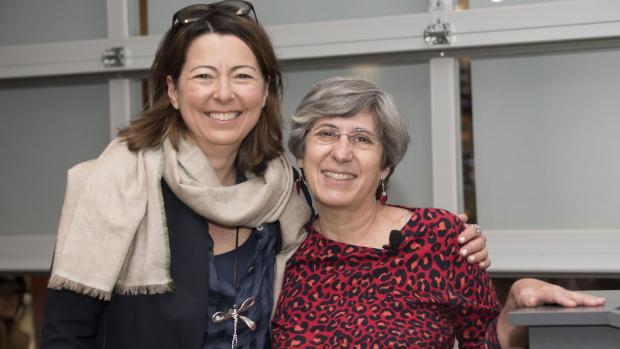Modern artificial intelligence — towards a lasting human-AI interaction

Dean Jelena Kovačević and Manuela Veloso, director of AI at J.P. Morgan and University Professor at Carnegie Mellon University
The founding head of the Collaborative Robot (CoBot) project, Manuela Veloso stepped up to a full house at NYU Tandon as the third speaker of this year’s edition of the popular AI lecture series, Modern Artificial Intelligence, hosted by NYU Tandon’s Department of Electrical and Computer Engineering and organized by Professor Anna Choromanska. Veloso is an international expert in artificial intelligence and robotics and presently serves as the director of AI at J.P. Morgan. Also the head of the Machine Learning Department and a University Professor in the School of Computer Science at Carnegie Mellon University (CMU), she is credited with not only leading the school’s CoBot team, but also helping to found the famed RoboCup Association, which aims to create a team of robots capable of beating human champions at soccer.
In her presentation, Veloso explored multi-agent robots that can collaborate with humans — and with one another — and how the technologies that make these remarkable symbioses possible are paving the way for a future that might well have sprung from the imagination of Isaac Asimov.
“AI systems are not going to be in the business of doing it all,” said Veloso, “So why not collaborate with humans and other robots to work and learn from each other?”
To illustrate, she described Carnegie Mellon’s own RoboCup team, how its component robots worked together to predict each move a “player” might make, and where its teammates might move, all within a 16-millisecond timeframe. Veloso became interested in CoBotics (a paradigm for human/machine interaction that J. Edward Colgate and Michael Peshkin of Northwestern University conceptualized in the mid-1990s) when she realized that, while RoboCup machines were very good at interacting with one another, there was no human collaboration involved.
Built on basic, cost-effective technology, a CoBot deployed at CMU could navigate any portion of a floor with varying degrees of certainty about its location. However, navigating to different floors and around obstacles posed a problem. CoBots overcame that by interacting with passers-by to help them get access to the elevators or remove obstacles that impeded their goal. Her work at JP Morgan, she suggested, mirrors her work in CMU, in that the goal is to build a similarly artificially intelligent system (albeit not on wheels) that works alongside the employees of JP Morgan across tasks.
“While what we have achieved is a step forward, there is one question that is critical to such robots. How can a robot answer, ‘What did you do when I was not in control?’” Veloso explained.
The first series of Modern Artificial Intelligence seminars in 2018 attracted more than a thousand students, faculty, and researchers to hear presentations by various stalwarts of AI and machine learning research. The talks have been viewed remotely by more than 4,200 people worldwide and are available on the ECE AI Seminar Series playlist on YouTube.
A subsequent seminar will feature Noble Prize-winning neuroscientist Eric Kandel.
________________________________________________________________
Videet Parekh
Tandon School of Engineering
Master of Science in Computer Science, Class of 2020

